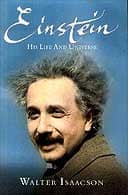Einstein: His Life and Universe
by Walter Isaacson
Simon & Schuster £25, pp675
In 2005, astronomers and cosmologists celebrated - in style - the 100th anniversary of their annus mirabilis: 1905. This was the year in which Albert Einstein wrote a set of scientific papers, including one containing the equation E=mc2 that changed our understanding of the universe and became the cornerstones of quantum mechanics and general relativity - the twin intellectual pinnacles of the 20th century. Not bad for a 26-year-old patent office clerk.
You can therefore understand what all the fuss was about. Journals, biographies, exhibitions, even plays and operas, were produced to mark the centenary. Every utterance, every scrap of paper produced by the great man was examined and debated in 2005. Nothing, surely, could have been left out, you would have thought. Certainly, another telling of Einstein's life story, only a couple of years later, must surely seem unnecessary and ambitious.
Yet Isaacson, a former chief executive of CNN and biographer of both Henry Kissinger and Benjamin Franklin, has triumphed over expectation, producing a thorough exploration of his subject's life, a skilful piece of scientific literature and a thumping good read.
According to Isaacson, we should regard Einstein not as an august scientific priest, but 'as a rebel with reverence for the harmony of nature', a scientist who rated imagination far higher than knowledge and an individual whose motto, at least in his early years, was 'Long live impudence! It is my guardian angel.'
On this last point, Einstein was probably misguided. Yes, he had an insolent streak, no one could doubt that, but it cost him dearly, though not without long-term beneficial consequences. Having displayed 'a sassy attitude' at the Zurich Polytechnic, where he studied physics, Einstein was his year's only graduate not to be offered a job. So he spent months applying unsuccessfully for academic posts across Europe. 'I will soon have graced every physicist from the North Sea to the southern tip of Italy with my offer,' he wrote mournfully on one occasion. He was even rejected by the Swiss army for having flat feet and varicose veins. In the end, he made do with the Swiss patent office.
And a good thing too, says Isaacson. 'Had he been consigned instead to the job of an assistant to a professor, he might have felt compelled to be overly cautious in challenging accepted notions.' Instead, Einstein did his day's work in a couple of hours and then sat back in his 'worldly cloister' and indulged in a merry scepticism in order to create some of the most beautiful, challenging ideas of modern science: the special theory of relativity and the idea that light behaves like particles, for example. 'Physics was to be upended, and Einstein was poised to be the one to do it,' says Isaacson.
It's one of the greatest stories of modern science and to his credit and my surprise, Isaacson has done a first-rate job in telling it. This is, quite simply, a riveting read.
